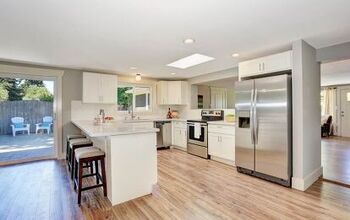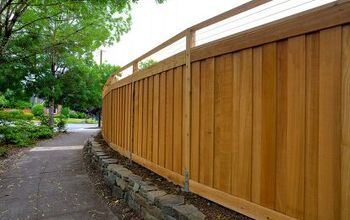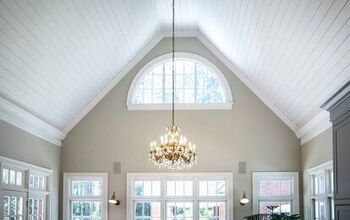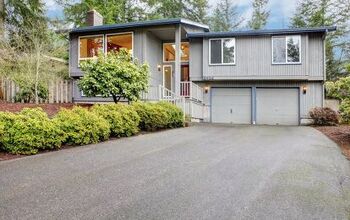Cost of Living in New Hampshire (Taxes, Housing & More)

New England is known for its food, history, culture, and beautiful fall seasons, among other things. New Hampshire is one of the states in New England that brings affordability and comfort to the region. With all that the state has going for its 1.36 million residents, how much is the cost of living in New Hampshire?
New Hampshire is an affordable state, with an overall cost of living only slightly higher than the national average. The median home value is $357,000, and rent averages $1,310 a month. There is no state income tax, the gasoline tax is low, and healthcare costs are below the national average. Utility costs tend to be high, but education costs are affordable.
The overall cost of living in New Hampshire can be affordable, but depending on the city, it can creep upward. Let’s take a good look at how much it costs for the average person to live in New Hampshire.
Do You Need to Hire Movers?
Get free, zero-commitment quotes from pro contractors near you.

New Hampshire Housing Prices
Housing costs in New Hampshire are below the national average, and ownership rates are above the national average. Right now, 59.6% of New Hampshire residents own their homes, and the median value is $357,000. Some popular New Hampshire cities, including the state capital Concord, are even more affordable, and houses average $302,300.
The majority of homes in the state are between $200,000 and $400,000. About 8% of homes are worth less than $100,000, and roughly 1.4% are worth over one million dollars.
| Location | Median Home Value | Homeownership Rate |
| New Hampshire | $357,000 | 59.6% |
| Concord NH | $302,300 | 49.6% |
| Portsmouth NH | $3564,000 | 49.3% |
| United States | $291,700 | 56.2% |
New Hampshire is a homeowner’s state, and monthly ownership costs are mostly affordable for the average household. The average homeowner in New Hampshire spends $1,917 per month in ownership fees, and $800 of that goes to bills. Cities such as Portsmouth, however, are much more expensive and average $2,245 per month in homeownership fees.
Monthly homeownership costs are often double or nearly double average rent prices for their respective cities. Owning a home in New Hampshire is attainable, but mortgage payments and bills span between $1,500 and $2,200 or more. Down payments and bills are not the only cost of owning a home, and you’ll pay yearly property taxes.
Property Taxes In New Hampshire
New Hampshire has a reputation for its low tax rates, but property taxes are the exception to that. The average effective property tax rate in New Hampshire is 2.20%, and the national average is 1.08%. Property tax rates apply to the assessed value of a home, and it is costly each year in New Hampshire.
In some areas of the state, you could pay almost triple the national average in property taxes. This high figure is something definitely worth considering if you plan to be a homeowner in New Hampshire.
Each county in New Hampshire varies in property tax rates, and how much you spend depends on property value. There are only 10 counties in New Hampshire as it is a small state, and they have different rates. The highest property tax rate in New Hampshire is in Sullivan County where the rate is 2.68%.
| New Hampshire Counties | Property Tax Rate | Average Tax Payment |
| Hillsborough County | 2.25% | $5,640 |
| Rockingham County | 2.08% | $6,153 |
| Carroll County | 1.34% | $3,044 |
| Belknap County | 1.81% | $3,989 |
| Strafford County | 2.41% | $5,324 |
Right now, Carroll County and Belknap County have the lowest property tax rates in New Hampshire. As you can see above, residents in most New Hampshire counties spend a lot in property taxes each year. High-value homes in New Hampshire counties with high property tax rates rack up $5,000 or more each year.
The Cost Of Rent In New Hampshire
The average cost of rent in New Hampshire is $1,310 per month for a two-bedroom apartment, but each city has different rent prices. Less than 25% of New Hampshire residents are renters, but good deals can be found in most cities. Right now, the lowest median rent in New Hampshire is Berlin, where residents spend $738 per month for a two-bedroom.
Notable New Hampshire cities, such as Manchester, have a wide range of apartment rentals available. You could spend between $1,100 and $1,800 per month, or more, in Manchester depending on your location within the city. Cities like Nashua, New Hampshire, cost between $927 and $1,549, the latter of which gets you a 3-bedroom apartment.
| New Hampshire Cities | Average Rent Cost for Two-Bedroom Apartment |
| Concord | $1,145 |
| Portsmouth | $1,593 |
| Manchester | $1,169 |
| Nashua | $1,220 |
| Derry | $1,409 |
| Berlin | $738 |
| Keene | $1.026 |
Housing costs are fairly low in New Hampshire, but many residents still find renting more affordable. If you find yourself surfing the housing market and unsure what to do, consider renting. You could get yourself a nice one-bedroom apartment in New Hampshire for less than $1,200 per month.
Average Utility Costs In New Hampshire
New Hampshire is known for many things, and one of them is high utility bills. Residents of New Hampshire spend an average of $477 each month on basic utilities, such as electricity and gas. Utility bills can be lower for small homes and for apartment rentals, but many households rack up hundreds in ills.
For example, an apartment’s utility bill could cost as little as $133-$145 per month in Nashua, New Hampshire. If you had a house with many bedrooms, bathrooms, and plumbing fixtures, however, your utility bill could cost $400-$500. Utility bill totals are more or less determined by energy consumption, and the number of people in the space.
New Hampshire is one of 6 total New England states in the top 10 highest utilities in the country. Electricity alone averages $169 in New Hampshire, and gas adds another $107 per month. Add up another $200 for water, internet, and cable, and utilities can creep up to $500 for New Hampshire residents.
New Hampshire Taxes
One benefit to living in New Hampshire is that it is a low tax state, and that’s hard to come by. Of course, New Hampshire’s property tax rate is high and averages 2.20%, but that is their only high tax rate.
New Hampshire does not impose income tax on your earnings from your job, but you are taxed for investments. Any profit from interest and dividends in New Hampshire comes along with a 5% tax rate. Retirement and Social Security benefits are not taxed in New Hampshire, either so you can enjoy your golden years.
The lack of state income tax also applies to retirement benefits, and retirees keep all of their Social Security income. Unless you generate interest and dividends in New Hampshire, you won’t pay any state income tax at all. Let’s take a look at New Hampshire’s tax rates and see if they are really as low as the state is known for
Sales Tax Rate In New Hampshire
New Hampshire has a 0% sales tax rate. That’s right, New Hampshire is one of 5 states, including Alaska and Delaware, that have a 0% sales tax rate. With that said, certain products, like tobacco and gasoline, do have tax rates that go along with purchases.
| New Hampshire Taxes | Cost & Rate |
| Property Tax | 2.20% |
| State Income Tax | 0% & 5% (Investment Income) |
| Sales Tax | 0% |
| Tobacco Tax | $1.78 (Per Package) 8% (Liquid Nicotine) |
| Gasoline Tax | $0.23 Per Gallon |
As you can see, New Hampshire imposes very few taxes on purchasable goods, although the tobacco tax is high. The $0.23 per gallon gasoline tax in New Hampshire is low and adds $3.45 for a 15-gallon fill-up. Not to mention, New Hampshire is one of few states that imposes no tax on the sale of alcohol products.
The Cost Of New Hampshire Transportation
Getting around is a necessity no where you live, and it is cheaper in some places than others. Thankfully, getting around town no matter where you live in New Hampshire is affordable. It is worth noting that a car is your best bet for transportation as public transit is not in every city.
Public Transportation In New Hampshire
New Hampshire may seem small, but it is spread out, and public transit is a lifesaver for commuting residents. Far and away the best method of public transportation throughout New Hampshire is taking the bus. Base fares for New Hampshire’s Coast bus cost between $0.75 and $1.50, and “on-demand” drop-offs cost $1.50-$3.00.
There are 15 cities in New Hampshire that have trains running through them, such as Concord, Manchester, and Portsmouth. Unfortunately, train tickets are expensive in New Hampshire, and the most affordable ticket to Manchester is $46. One of the best cities for public transportation in New Hampshire is Manchester, and monthly bus passes only cost $60.
For now, New Hampshire is not the greatest state for public transit, but it is expanding as of right now. By 2023, New Hampshire will boast a widespread light rail system, and that will reinvigorate public transit in the state
| Manchester New Hampshire Transportation | Average Cost |
| Train Ticket | $46 |
| Single Day Bus Pass | $2.50 (Disabled) $5 (Standard Rate) |
| Weekly Bus Pass | $20 |
| Monthly Bus Pass | $60 |
| Taxicab Fare | $1.50 Per Mile |
Driving Costs In New Hampshire
Driving across New Hampshire is quite satisfying and knowing that it is inexpensive doesn’t hurt. A gallon of regular gasoline only costs $2.01, on average, or $2.67 per gallon for premium. Driver’s education courses are also inexpensive in New Hampshire, and cost between $19 and $30 for online classes.
You probably won’t drive the average 656 gallons per year in New Hampshire unless you are a daily commuter. If you do commute regularly, however, you could spend between $1,318 and $1,751 per year on gasoline. Gasoline isn’t the online cost of driving, however, and you’ll need car insurance in New Hampshire.
Car insurance premiums in New Hampshire are 24% less than the national average, and it saves you hundreds per year. The average car insurance holder in New Hampshire pays $1,083 per year in premiums, but driving history plays a role as well. Your cheapest full coverage option in New Hampshire is Geico, and their lowest premium rate is $905 per year.
Cost Of Living In New Hampshire: Education Costs
Luckily for parents in New Hampshire, the state’s public education system is extraordinary and lets you hold onto your money. Parents looking to save for their child’s college tuition can rest easy knowing that New Hampshire’s public school system is great. Of course, public schooling isn’t the only option, and New Hampshire parents average $19,386 per year, on private school.
Private elementary school is often cheaper, and it costs an average of $8,511 per year for tuition. Sending your kids to private high school in New Hampshire is more expensive, and averages $28,220 per year for tuition. You can find private tuition for as low as $1,500 per year in New Hampshire, but you’ll generally pay more.
| New Hampshire Education | Average Tuition Cost |
| Average Private School Tuition | $19,386 |
| Private Elementary Tuition | $8,511 |
| Private High School Tuition | $28,220 |
| University of New Hampshire | $18,879 (Resident) $35,409 (Non-Resident) |
| Dartmouth College | $57,638 |
New Hampshire is also known for its prestigious college institutions. Perhaps one of the most well known New Hampshire colleges is Dartmouth College, which costs $57,638 per year. The University of New Hampshire costs $18,879 for state residents and $35,409 for out of state students.
Cost Of Living In New Hampshire: Entertainment Costs
You can have fun for the whole family at a low cost in New Hampshire no matter where you live. The Strawberry Banke Museum in Portsmouth, for example, costs $5 for kids, and $10 for adults. Or, head to the Squam Lakes Natural Science Center for $23-$27 per person and have educational fun with the family.
If you’re in the mood for spooky fun, check out New England Curiosities Walking Tours for between $15 and $35. New Hampshire’s first aquarium is the Living Shores Aquarium, and adult tickets cost $19 per person. Like anywhere else, you can find movie tickets for between $8 and $12 in New Hampshire for cheap fun.
| New Hampshire Entertainment | Average Price |
| Strawberry Banke Museum | $5 (Kids) $10 (Adults) |
| Squam Lakes Natural Science Center | $23-$27 |
| New England Curiosities Walking Tours | $15-$35 |
| Living Shores Aquarium | $19 |
| Movie Theater Ticket | $8-$12 |
You don’t have to open up your wallet to have fun and entertainment in New Hampshire. There are a whopping 93 parks in New Hampshire, and each one is more beautiful than the last. Head to Hampton Beach State Park, Pawtuckaway State Park, and Franconia Notch State Park for unforgettable hikes.
Suncook Has The Cheapest Cost Of Living In New Hampshire
- Median Home Value: $248,224
- Average Monthly Rent Cost: $905
- Average Monthly Utility Bill: $240-$400+
- Median Income: $64,151
- Population: 5,111
Suncook has the cheapest cost of living in New Hampshire, and rent costs $905 per month, on average. The median home value in Suncook is $248,224, and that is below both the state and national average in America. Gas rarely costs more than $2.00 per gallon in Suncook, New Hampshire, and it’s currently only $1.86 per gallon.
Gasoline isn’t the only low driving cost in Suncook, New Hampshire. You can find car insurance plans that start at $48 per month in Suncook, or $709 per year from Travelers. New Hampshire is a somewhat low-income state, and the median household income in Suncook is $64,151 per year.
There are 4 private schools in Suncook, New Hampshire, and they cost between $1,400 and $8,000 or more per year. Property taxes are high in New Hampshire, and they come at a rate of 2.39% on assessed property value. Some of the other cheapest places in New Hampshire include Berlin, Laconia, and Somersworth.
Summing It Up
New Hampshire is an affordable state, and the vast majority of its residents are homeowners. The median home value in New Hampshire is $357,000, and there’s an average $1,917 monthly homeownership cost in the state. One of the more expensive New Hampshire cities, Portsmouth, costs $2,245 per month in ownership costs.
If you choose to rent in New Hampshire, you can expect to pay $1,310 per month, on average for a two-bedroom apartment. Public education is a great option to keep living costs low as a parent in New Hampshire. However, you could opt for a private school, but be aware that private tuition averages $19,386 per year.
Utility bills are higher than the national average in New Hampshire, and they average $477 per month. The average New Hampshire resident pays $1,083 per year in car insurance premiums and up to $1,318 per year. Yes, the cost of living in New Hampshire can be expensive, but you can get by cheaply by taking advantage of the low tax rates and affordable housing.
Related Questions
Is New Hampshire a good place to live?
Yes, New Hampshire is a great place to live, and it’s consistently in the top 10 safest places to live. As you’ve seen, the cost of living in New Hampshire is somewhat bigger than the national average, but low tax rates make up for it. Housing, driving, and grocery costs are all low, and there’s no shortage of places to live that are family-friendly.The overall crime rate in New Hampshire is well under the national average. There are approximately 2,000 violent crimes and 15,014 property crimes annually in the entire state.Your chances of becoming a victim of a violent crime in New Hampshire are 1 in 689 and 1 in 92 for property crime. It’s estimated that there are about 4 crimes per square mile in the state, compared to the national average of 26.9.
What is the weather like in New Hampshire year-round?
New Hampshire is humid, and the New England state experiences all 4 seasons throughout the year. The summer can get quite hot in New Hampshire, but you’ll need to bundle up for those cold winters. If you find yourself in New Hampshire during the fall season, look around and enjoy the beautiful leaf changes.
How much money do you need to make to live comfortably in New Hampshire?
In a nutshell, according to GoBankingRates.com, you would need an income of about $69,920 per year to live comfortably in New Hampshire. This would allow you to live in a single-family residence without your housing costs or rent consuming more than 30% of your income.Based on the latest reported median income of New Hampshire, this should be fairly doable since the median income was $77,933.
Do You Need to Hire Movers?
Get free, zero-commitment quotes from pro contractors near you.


Nick Durante is a professional writer with a primary focus on home improvement. When he is not writing about home improvement or taking on projects around the house, he likes to read and create art. He is always looking towards the newest trends in home improvement.
More by Nick Durante



























